Unit 7 Teenagers should be allowed to choose their own clothes Section B 3a-self check 写作课件(共20张PPT)
文档属性
| 名称 | Unit 7 Teenagers should be allowed to choose their own clothes Section B 3a-self check 写作课件(共20张PPT) | 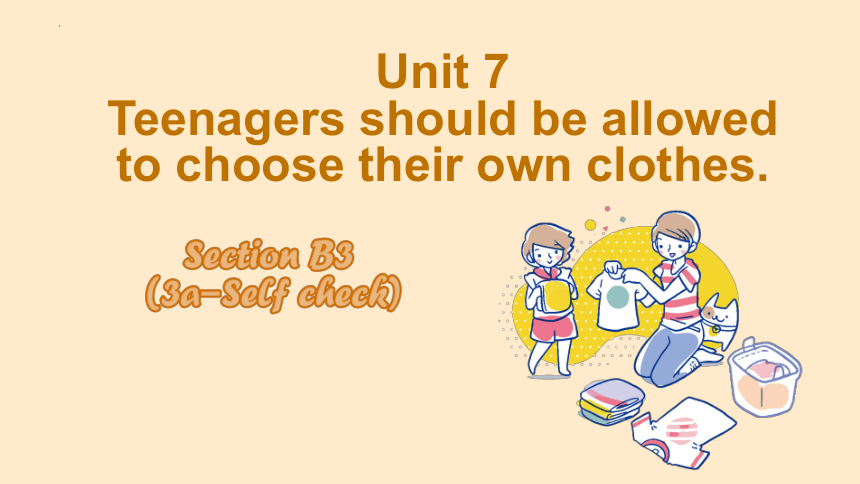 | |
| 格式 | pptx | ||
| 文件大小 | 23.9MB | ||
| 资源类型 | 教案 | ||
| 版本资源 | 人教新目标(Go for it)版 | ||
| 科目 | 英语 | ||
| 更新时间 | 2024-12-13 08:45:45 | ||
图片预览



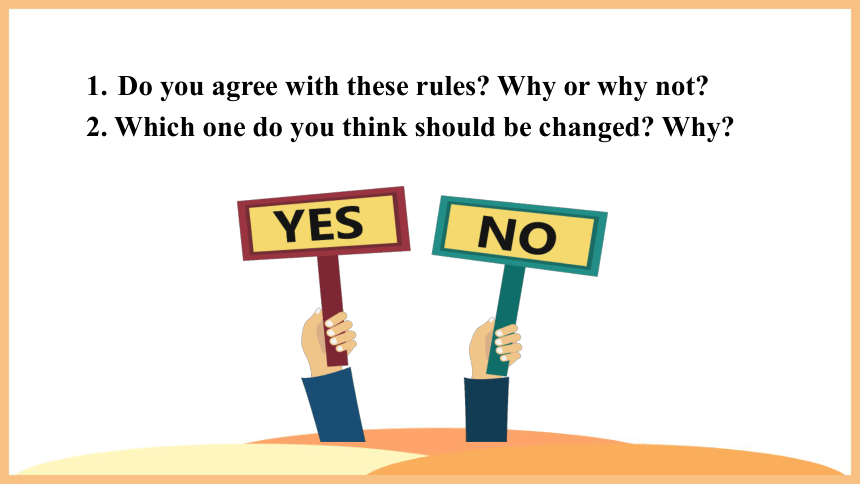
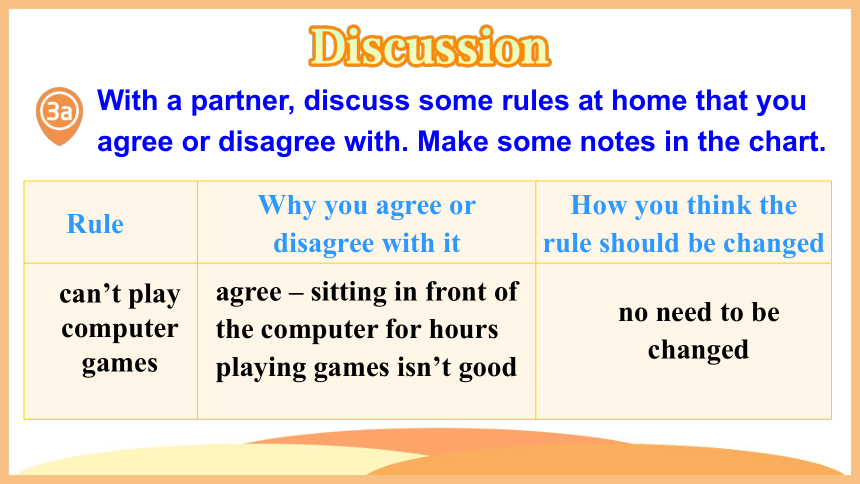
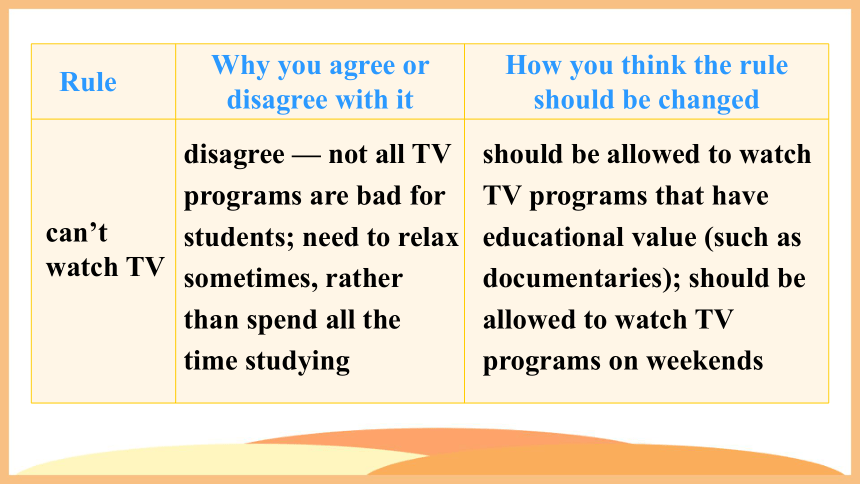
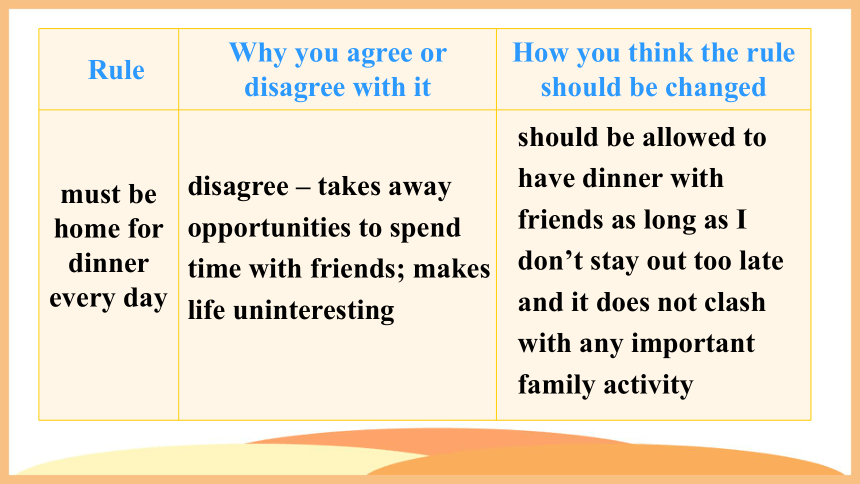
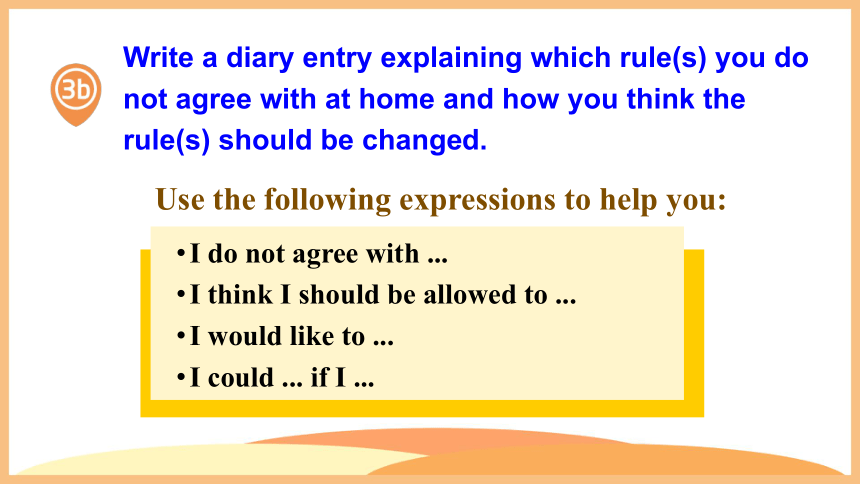
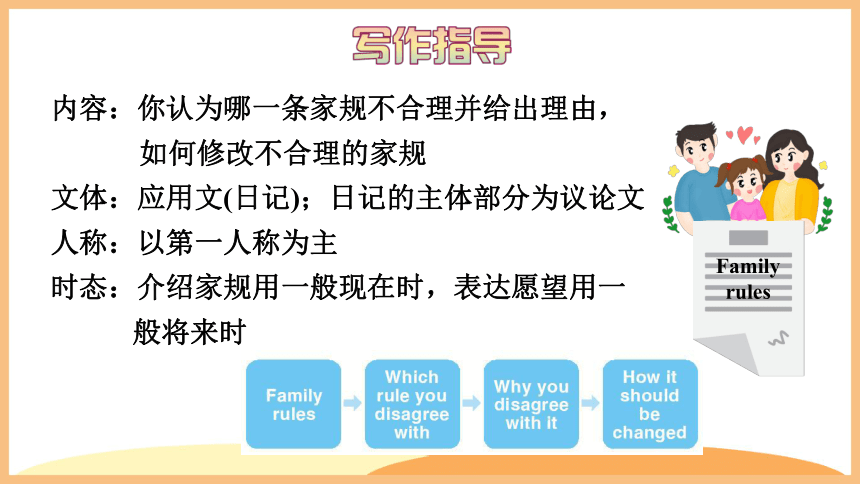
文档简介
(共20张PPT)
Unit 7
Teenagers should be allowed
to choose their own clothes.
What rules do you have at home
Do you have any rules about eating, sleeping, housework, homework, or making friends Write them down by using “be (not) allowed to do”.
rules
What rules do you have at home
eating
sleeping
homework
housework
eat at home every day, mustn’t eat junk food, …
don’t stay up late, get up at 6:30 a.m., …
make the bed, wash the dishes …
finish homework on time, …
Do you agree with these rules Why or why not
2. Which one do you think should be changed Why
With a partner, discuss some rules at home that you agree or disagree with. Make some notes in the chart.
Rule Why you agree or disagree with it How you think the rule should be changed
agree – sitting in front of the computer for hours playing games isn’t good
no need to be changed
can’t play computer games
Rule Why you agree or disagree with it How you think the rule should be changed
should be allowed to watch TV programs that have educational value (such as documentaries); should be allowed to watch TV programs on weekends
disagree — not all TV programs are bad for students; need to relax sometimes, rather than spend all the time studying
can’t watch TV
Rule Why you agree or disagree with it How you think the rule should be changed
should be allowed to have dinner with friends as long as I don’t stay out too late and it does not clash with any important family activity
disagree – takes away opportunities to spend time with friends; makes life uninteresting
must be home for dinner every day
Write a diary entry explaining which rule(s) you do not agree with at home and how you think the rule(s) should be changed.
I do not agree with ...
I think I should be allowed to ...
I would like to ...
I could ... if I ...
Use the following expressions to help you:
Family
rules
内容:你认为哪一条家规不合理并给出理由,如何修改不合理的家规
文体:应用文(日记);日记的主体部分为议论文
人称:以第一人称为主
时态:介绍家规用一般现在时,表达愿望用一般将来时
Dear Diary,
There are many rules in my family. Some of them are really helpful. However, there are some terrible rules that make me unhappy. For example, I’m not allowed to watch TV on weekdays. We students get tired easily after a day’s study and watching TV can relax ourselves from pressure. It could be easier for us to pay attention to our homework if we can relax ourselves. Besides, I can learn a lot from different TV programs and broaden my horizons.
I think I should be allowed to watch TV for a while when I get home.
All in all, my parents make these rules to help me be better, but some of my family rules are too strict. I think they should be changed!
1. Match the words in the two columns and choose five phrases to make sentences.
take do get achieve make go shopping
photos
my dream
ears pierced
part-time work
a choice
take photos
e.g. This is a good place for tourists to take photos.
do part-time work
e.g. It is common for university students to do part-time work to help pay for their studies.
get ears pierced
e.g. I would like to get my ears pierced when I am twenty-one years old.
achieve my dream
e.g. I hope to achieve my dream of becoming a doctor.
make a choice
e.g. It is difficult for me to make a choice between these two bags because I like both of them.
go shopping
e.g. I go shopping with my parents every Saturday afternoon.
get take do make go
a surprise a test homework breakfast shopping
a shock a shower the washing the bed online
a new car a rest the ironing a list travelling
a lot of rain a walk housework a mistake swimming
good grades a seat chores a choice camping
things done care of some cleaning a decision fishing
a gift part in a plan boating
2. Complete the sentences using the correct forms of the words in brackets. Translate them into Chinese.
1) No matter how many difficulties we have, I believe all problems can __________ (solve) in the end.
be solved
无论我们会遇到多少困难,我相信所有的问题最终都会得到解决。
2) Mobile phones should __________ (keep) off during the meeting.
be kept
会议期间禁止使用手机。
3) Teenagers under eighteen must _______________ (not allow) to smoke or drink.
not be allowed
必须禁止十八岁以下的青少年吸烟或饮酒。
4) Many parents think going to school must _________ (put) first, so teenagers should __________________ (not encourage) to work part-time.
be put
not be encouraged
许多父母认为必须把上学的事情放在首要位置,因而不应鼓励青少年做兼职工作。
1. No matter how many difficulties we have, I believe all problems can be solved in the end.
no matter“无论; 不论” (与疑问词连用引导让步状语从句)
e.g. No matter what may happen, they’ve decided to leave this evening.
You are always welcome no matter where you are.
“no matter + 疑问词”结构引导的让步状语从句可以与
“疑问词-ever” 进行同义句转换。
e.g. Whoever / No matter who you are, you must knock at the door before enter the room.
Keep calm, whatever / no matter what happens.
2. Mobile phones should be kept off during the meeting.
keep off 关闭状态
keep off 避开;避免;回避;不接近
e.g. Keep off the grass!
请勿践踏草地!
My doctor has warned me to keep off sugar.
我的医生劝我别吃糖。
【语境应用】翻译句子。
1) 我尽量不吃高脂肪食物。
2) 他们点燃篝火防止野兽靠近。
I'm trying to keep off fatty foods.
They lit a fire to keep off wild animals.
Unit 7
Teenagers should be allowed
to choose their own clothes.
What rules do you have at home
Do you have any rules about eating, sleeping, housework, homework, or making friends Write them down by using “be (not) allowed to do”.
rules
What rules do you have at home
eating
sleeping
homework
housework
eat at home every day, mustn’t eat junk food, …
don’t stay up late, get up at 6:30 a.m., …
make the bed, wash the dishes …
finish homework on time, …
Do you agree with these rules Why or why not
2. Which one do you think should be changed Why
With a partner, discuss some rules at home that you agree or disagree with. Make some notes in the chart.
Rule Why you agree or disagree with it How you think the rule should be changed
agree – sitting in front of the computer for hours playing games isn’t good
no need to be changed
can’t play computer games
Rule Why you agree or disagree with it How you think the rule should be changed
should be allowed to watch TV programs that have educational value (such as documentaries); should be allowed to watch TV programs on weekends
disagree — not all TV programs are bad for students; need to relax sometimes, rather than spend all the time studying
can’t watch TV
Rule Why you agree or disagree with it How you think the rule should be changed
should be allowed to have dinner with friends as long as I don’t stay out too late and it does not clash with any important family activity
disagree – takes away opportunities to spend time with friends; makes life uninteresting
must be home for dinner every day
Write a diary entry explaining which rule(s) you do not agree with at home and how you think the rule(s) should be changed.
I do not agree with ...
I think I should be allowed to ...
I would like to ...
I could ... if I ...
Use the following expressions to help you:
Family
rules
内容:你认为哪一条家规不合理并给出理由,如何修改不合理的家规
文体:应用文(日记);日记的主体部分为议论文
人称:以第一人称为主
时态:介绍家规用一般现在时,表达愿望用一般将来时
Dear Diary,
There are many rules in my family. Some of them are really helpful. However, there are some terrible rules that make me unhappy. For example, I’m not allowed to watch TV on weekdays. We students get tired easily after a day’s study and watching TV can relax ourselves from pressure. It could be easier for us to pay attention to our homework if we can relax ourselves. Besides, I can learn a lot from different TV programs and broaden my horizons.
I think I should be allowed to watch TV for a while when I get home.
All in all, my parents make these rules to help me be better, but some of my family rules are too strict. I think they should be changed!
1. Match the words in the two columns and choose five phrases to make sentences.
take do get achieve make go shopping
photos
my dream
ears pierced
part-time work
a choice
take photos
e.g. This is a good place for tourists to take photos.
do part-time work
e.g. It is common for university students to do part-time work to help pay for their studies.
get ears pierced
e.g. I would like to get my ears pierced when I am twenty-one years old.
achieve my dream
e.g. I hope to achieve my dream of becoming a doctor.
make a choice
e.g. It is difficult for me to make a choice between these two bags because I like both of them.
go shopping
e.g. I go shopping with my parents every Saturday afternoon.
get take do make go
a surprise a test homework breakfast shopping
a shock a shower the washing the bed online
a new car a rest the ironing a list travelling
a lot of rain a walk housework a mistake swimming
good grades a seat chores a choice camping
things done care of some cleaning a decision fishing
a gift part in a plan boating
2. Complete the sentences using the correct forms of the words in brackets. Translate them into Chinese.
1) No matter how many difficulties we have, I believe all problems can __________ (solve) in the end.
be solved
无论我们会遇到多少困难,我相信所有的问题最终都会得到解决。
2) Mobile phones should __________ (keep) off during the meeting.
be kept
会议期间禁止使用手机。
3) Teenagers under eighteen must _______________ (not allow) to smoke or drink.
not be allowed
必须禁止十八岁以下的青少年吸烟或饮酒。
4) Many parents think going to school must _________ (put) first, so teenagers should __________________ (not encourage) to work part-time.
be put
not be encouraged
许多父母认为必须把上学的事情放在首要位置,因而不应鼓励青少年做兼职工作。
1. No matter how many difficulties we have, I believe all problems can be solved in the end.
no matter“无论; 不论” (与疑问词连用引导让步状语从句)
e.g. No matter what may happen, they’ve decided to leave this evening.
You are always welcome no matter where you are.
“no matter + 疑问词”结构引导的让步状语从句可以与
“疑问词-ever” 进行同义句转换。
e.g. Whoever / No matter who you are, you must knock at the door before enter the room.
Keep calm, whatever / no matter what happens.
2. Mobile phones should be kept off during the meeting.
keep off 关闭状态
keep off 避开;避免;回避;不接近
e.g. Keep off the grass!
请勿践踏草地!
My doctor has warned me to keep off sugar.
我的医生劝我别吃糖。
【语境应用】翻译句子。
1) 我尽量不吃高脂肪食物。
2) 他们点燃篝火防止野兽靠近。
I'm trying to keep off fatty foods.
They lit a fire to keep off wild animals.
同课章节目录
- Unit 1 How can we become good learners.
- Section A
- Section B
- Unit 2 I think that mooncakes are delicious!
- Section A
- Section B
- Unit 3 Could you please tell me where the restroom
- Section A
- Section B
- Unit 4 I used to be afraid of the dark.
- Section A
- Section B
- Unit 5 What are the shirts made of?
- Section A
- Section B
- Review of Units 1-5
- Unit 6 When was it invented?
- Section A
- Section B
- Unit 7 Teenagers should be allowed to choose their
- Section A
- Section B
- Unit 8 It must belong to Carla.
- Section A
- Section B
- Unit 9 I like music that I can dance to.
- Section A
- Section B
- Unit 10 You're supposed to shake hands.
- Section A
- Section B
- Review of Units 6-10
- Unit 11 Sad movies make me cry.
- Section A
- Section B
- Unit 12 Life is full of the unexpected
- Section A
- Section B
- Unit 13 We're trying to save the earth!
- Section A
- Section B
- Unit 14 I remember meeting all of you in Grade 7.
- Section A
- Section B
- Review of Units 11-14
